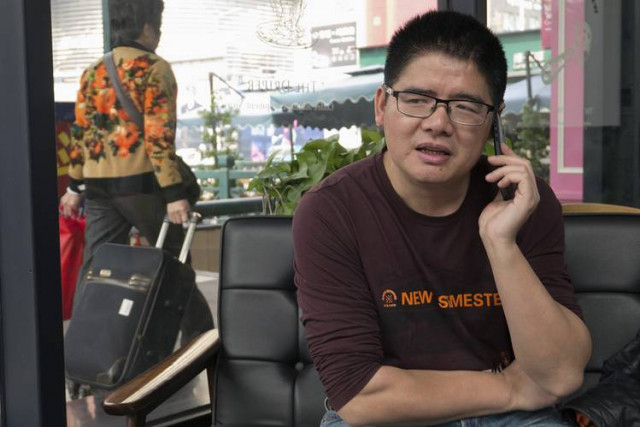China sentences activists for 'disturbing social order': Xinhua
Independent trade unions are banned in China, with only All-China Federation of Trade Unions legally recognised

Chinese authorities accused Zeng Feiyang, two co-workers of “gathering crowds to disrupt social order”. PHOTO: ONLINE
Zeng Feiyang, director of the prominent labour rights group the Panyu Workers' Centre, was given a three-year sentence suspended for four years, while his co-workers Tang Huanxing and Zhu Xiaomei received 18 months suspended for two years, the official Xinhua news agency said.
They had been helping workers in the southern province of Guangdong win payment of wages and unpaid benefits in disputes against employers, but were convicted of "ignoring national laws and organising mass gatherings that disturbed social order," Xinhua cited a Guangdong court as saying.
Independent trade unions are banned in China, with only the official All-China Federation of Trade Unions legally recognised. However, critics say it often fails to assist workers in disputes.
"I accepted training and funding from overseas organisations hostile to China, and, at their request, incited and organised workers to protect their rights in an extreme way," Zeng said in his closing remarks, according to Xinhua.
"I hope that others will take my case as a lesson and not be conned by such organisations," he added.
A Monday report from the Ministry of Public Security claimed that Zeng had misappropriated funds from "multiple overseas groups and foreign embassies" since 2010, Xinhua said.
It quoted activist Tang as saying: "On the surface, we seem to be fighting for workers' rights, but the real intention was to expand our influence, particularly overseas."
All three defendants pled guilty and said they would not appeal.
Guangdong is one of China's richest provinces, but is confronting growing economic challenges as many factories in the Pearl River Delta close or relocate to cheaper Chinese provinces -- or countries such as Vietnam where labour costs are lower.
Workers are often left with unpaid wages and no redundancy pay.
The court sentence comes in the midst of what rights groups have called an "unprecedented" campaign of arrests of labour activists, as well as a broader crackdown on dissent that has seen hundreds detained and dozens jailed in the years since President Xi Jinping came to power in 2013.



















COMMENTS
Comments are moderated and generally will be posted if they are on-topic and not abusive.
For more information, please see our Comments FAQ